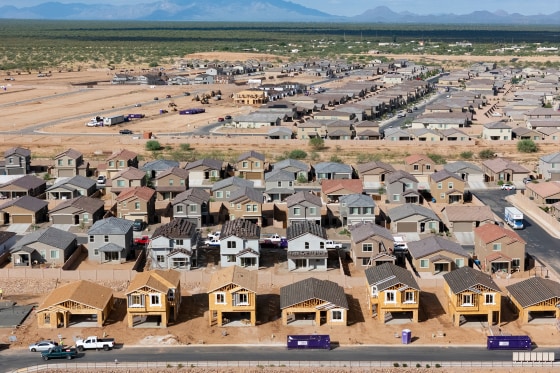
Due to high mortgage interest rates, a limited number of available properties, and historically high home prices, the U.S. housing market was already having difficulties.
Now, further pressure is being added by building material tariffs.
The United States imports about 30% of its softwood lumber, mostly from Canada. Gypsum, also referred to as wallboard, is supplied from Mexico. President Donald Trump’s 25% tax on goods from the two major trading partners will increase the cost of such commodities. Mexico tariffs are still a possibility even though they were put on hold for a month on Monday.
Carl Harris, the head of the National Association of Home Builders, stated in a press release that over 70% of the imports of two crucial components used by home builders—softwood timber and gypsum—come from Canada and Mexico, respectively. Tariffs imposed on lumber and other building supplies raise construction costs, deter new development, and ultimately result in higher housing prices for consumers.
According to the most recent reading from the S&P Corelogic Case-Shiller national home price index, home prices have already increased by more than 40% since the epidemic began and were 3.8% higher in November than they were in the previous November. Compared to the 3.6% growth in October, that yearly gain was larger.
Building material duties may further complicate the market for purchasers.
We think that this might exacerbate the first-time buyer affordability crisis. On the plus side, Jaret Seiberg, a housing policy analyst at TD Cowen Washington Research Group, noted that it might put additional pressure on Congress to pass laws that support more entry-level building, such as increased tax credit programs.
Noting his executive order on the first day of his office that aimed to increase the supply of homes, NAHB is requesting that the Trump administration exempt building materials from the 25% tariffs.
Despite recent increases in lumber output, Canada accounts for 70% of the $8.5 billion in sawmill and wood product imports into the United States. Trump’s proposed policy would increase the 14.5% tariff that presently applies to them to more than 39%.
Additionally, Mexico accounts for $352 million in imports of gypsum and lime products, or 71% of total imports. China is the source of other resources, such as appliances and steel. On Saturday, Trump imposed an extra 10% duty on Chinese goods.
According to the NAHB, if new tariffs on imports from China, Canada, and Mexico are implemented, the cost of building materials may increase by $3 billion to $4 billion, which would make it more difficult for builders to finish projects.
Big builders are not exempt from the tariffs, but smaller homebuilders with narrower margins are probably going to be worse hurt.
Sheryl Palmer, CEO of Arizona-based homebuilder Taylor Morrison, stated that even if a lower percentage of our lumber comes from Canada and some components from Mexico, we will all be impacted, which may have an immediate effect on buyers’ ability to buy a house. I sincerely hope that these will be temporary, as some customers are still finding it difficult to cope with rising interest rates.
Since the Trump administration began large deportations of undocumented immigrants, builders have already had to deal with a labor scarcity that is only growing worse. The National Immigration Forum, an immigration advocacy group, estimates that about 30% of construction workers are immigrants, and a sizable portion of those workers lack proper documentation.
You can force them all to leave the nation, but who will construct homes? stated Bruce McNeilage, CEO of Kinloch Partners, a single-family rental housing developer with headquarters in Nashville.
Although new home development is primarily affected by tariffs, the current market may also be impacted. All prospective purchasers will have less money to save for a down payment if the price of other consumer products rises.
Interest rates were also predicted to decline this year, but they might even increase if the tariffs cause inflation to spike once more. This combination of emotional views of personal wealth and economic realities could have a significant impact on the crucial, impending spring market.
More from CNBC:
-
Trump s tariffs could threaten Hollywood production, box office recovery
-
Ontario premier says he s ripping up $100 million contract with Musk s Starlink in response to U.S. tariffs
-
New York City office demand is finally back to normal
